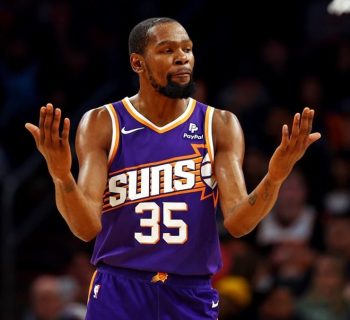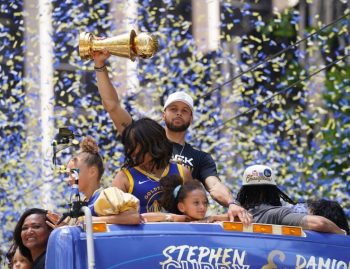NBA
NBA PM: What 0-2 Really Means

Kiss Those 0-2 Teams Goodbye
Thanks to the San Antonio Spurs’ road win against the Los Angeles Clippers on Thursday, there still has never been an occurrence in NBA history where every first-round playoff series started off with one team boasting a 2-0 lead. Still, it was close enough to happening that everyone can agree that these have been some of the least dramatic playoffs in recent memory.
In any event, there are seven teams that at some point in these playoffs have had to game plan for winning four out of five games against some of the best and most talented rosters in the NBA. That’s a tall task for good teams like Portland and Toronto, but even taller for burgeoning squads like Milwaukee and Boston.
The reality is that 94 percent of the teams that jump out to a 2-0 lead in a playoff series are going to walk away from that series victorious. That’s not good news for the aforementioned four teams, as well as New Orleans, Brooklyn and Dallas. In fact, only 16 teams have ever climbed out of that hole in 46 years, which helps put into perspective what a 2-0 hole really means.
Even more disconcerting is that six of the seven teams that jumped out to the 2-0 series lead had homecourt advantage in their series, and of course the one team that won both of its first two games on the road (Washington), will now play three of the next five games at home.
And of the 16 teams that climb out of an 0-2 hole, a good number of them were legendary teams consistently seeing large-scale success in a given season, not lower seeds making miracle comebacks. For example, the 1969 Boston Celtics won a ring doing it, Michael Jordan charged back over the New York Knicks in the 1993 Conference Semifinals, and the Hakeem Olajuwon-led Houston Rockets did it two years in a row over the Phoenix Suns en route to their back-to-back championships in the mid-1990s.
In short, it just doesn’t happen very often, which means only two or three games into these first-round series, we already have a pretty good sense of who is going to end up playing next round in the Conference Semifinals. Most likely, we can count on Atlanta facing off against Washington, Chicago taking on Cleveland and Golden State squaring off against Memphis. The only thing still up in the air, statistically speaking, is whether Houston will face the Clippers or the Spurs.
That’s not to say there won’t be any drama in the remaining portion of the first round. Plenty of teams down 0-2 have charged back to at least force a Game 7. The numbers just don’t support them winning that game.
Of course, a 0-3 hole is even nastier, obviously, since no NBA team has ever come back from that deficit to win a seven-game series. Have a good summer, Milwaukee Bucks, New Orleans Pelicans and Boston Celtics.
Josh Childress Talks Money and Walking Away from the NBA
It’s been several years since NBA fans have seen Josh Childress, but the swingman is still playing ball overseas and, apparently, giving extremely candid interviews about life in and around the NBA.
In a recent sit-down with GRIT Media, Childress really let it all hang out about his time in the league. First and foremost, he said the money he earned as a lottery pick was really hard for him to manage at such a young age.
“[I was] 21 years old, sixth pick in the draft, and I sign a four-year, $11 million deal,” Childress said. “The first mistake is people say, ‘Ok I’ve got $11 million.’ You’ve really got $5 million over four years, so that million-dollar house that you bought thinking you had $10 million more, that house then becomes more expensive.
“You buy a house, then most guys buy their mother a house or a car, they buy themselves a car. You’ve got a two-to-four percent agent fee, you’ve got the NBA escrow, so that check gets eaten up.”
For any rookie, Childress said, financial role models can be hard to come by.
“Some of my veterans spent a little more than others,” he said. “I’m not going to name names, but if those are the guys that are taking you under your wing, that’s what you get used to and that’s how you think it’s supposed to be. You get caught up in that, and then you end up spending way more than you should.”
Even the little things, Childress explained, can siphon away an NBA player’s money.
“I remember one of my vets was Tony Delk. Played at Kentucky, great guy,” he said. “I had this toiletry bag. It wasn’t super-expensive, and it was like falling apart, had a hole in it. He told me, ‘Come on, you’re an NBA player. We need to get you something nice. You can’t be walking around with this nonsense.’ That was the first time I felt… like I had to represent myself like a professional. I ended up going and getting like a Louis Vuitton one. Over time, I bought some of that stuff, and I did fall into that pattern.”
Finances weren’t Childress’ only problem in the NBA, however. He also struggled to stay on rosters, especially after his frustrating tenure with the Phoenix Suns.
“Man, I had some tough, tough times in Phoenix,” he said. “Phoenix was the first time in my career that I didn’t really have a consistent role on the team, and that was difficult for me. That really messed with my head a lot because I had signed a pretty good deal there. I’m like playing one game, to not playing the next 10.”
He doesn’t blame anybody for that, though; he knows that sometimes a lack of success on a basketball team just comes down to role, and in Phoenix, he didn’t have a consistent one.
“People can say, ‘Oh you didn’t play well,’ but I think part of that goes to consistency,” he said. “I have consistently always been on the floor. That was tough.”
Even tougher, though, was the first time he got released.
“That was in Brooklyn,” he said. “I actually went in and asked them to release me. So Avery Johnson had just gotten fired and the new coach (P.J. Carlisemo) came in and there was a game (where) we were up like 20 or 25 or something with maybe six minutes left in the fourth, so he puts me in the game. He puts a whole new five in, guys that haven’t played much. I think that team cut the lead to 16 with maybe like three to four minutes left in the game and he pulls everybody. I was like, ‘You know what? If this coach doesn’t feel that I’m a good enough player to stay on the floor up 16 with two minutes left in this game, then I don’t need to be here.’ So I asked to leave. And most guys would say that I’m crazy. I don’t know if any guys have done that before, but for me, it was a little bit of a pride thing, like I felt like I was good enough to stay in that game, but obviously he had a different perspective.”
But, as Childress explains, he took that opportunity to go back to school and finish his degree. He played in Australia this past season (as he opened up to Basketball Insiders about recently), but tore a pectoral muscle and was forced to miss the rest of the year. He had been averaging 21.1 PPG, 9.2 RPG, 4.2 APG and 2.1 BPG, which clearly is a testament to the competition, but also proof that he’s nowhere close to washed up.
He may never play in the NBA again, but his honesty in these interviews is refreshing. Players aren’t often that candid about their time in the league.













